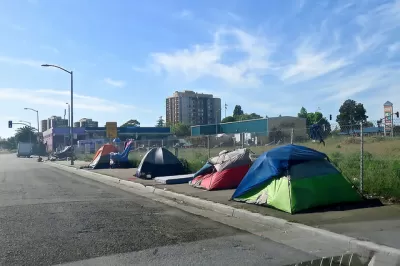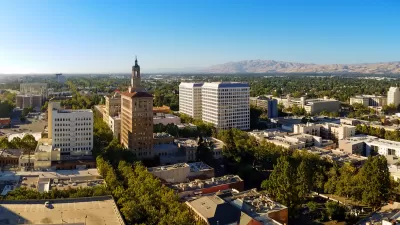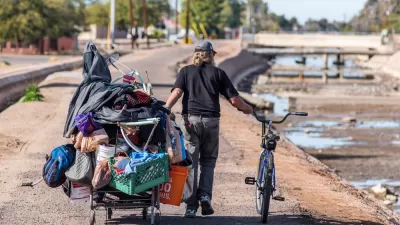A new federal report finds a few reasons for optimism in a nationwide homeless count, but the numbers of homeless in the United States have grown for the second year in a row.

The U.S. Department of Housing and Urban Development (HUD) released its "2018 Annual Homeless Assessment Report (AHAR) to Congress" [pdf] report last week.
"Despite the booming economy, homelessness in the United States rose slightly for the second year in a row, with spikes in high-rent cities like New York and Seattle," reports Glenn Thrush of the report's findings.
"Over all, the national rate of homelessness rose by a modest 0.3 percent to 552,830 people without stable living conditions, the report found. But that represented the second annual increase after seven straight years of declines — the result, in part, of rapidly increasing housing costs that have only recently shown signs of leveling off," adds Thrush. Thrush's coverage, for the New York Times, focused on the bleak, and worsening, homelessness situation in the country.
The report inspired public relations work from HUD and additional media coverage, which are revealing for their differences.
The Associated Press reported from Los Angeles, which achieved a slight decrease in its homeless numbers, which city officials credited to the success of new programs enabled by voter-approved taxes in 2017.
An article by Kelsey Ramirez cut the bad news about the increase in overall homelessness with good news about decreasing veteran and family homelessness.
A press release from the U.S. Department of Housing and Urban Development was the only communication to claim that homelessness isn't worsening around the country as a whole. Instead, reads the headline, homelessness is "unchanged in 2018."
FULL STORY: Homelessness Rises Slightly Despite Strong Economy, Federal Report Finds

Planetizen Federal Action Tracker
A weekly monitor of how Trump’s orders and actions are impacting planners and planning in America.

Maui's Vacation Rental Debate Turns Ugly
Verbal attacks, misinformation campaigns and fistfights plague a high-stakes debate to convert thousands of vacation rentals into long-term housing.

San Francisco Suspends Traffic Calming Amidst Record Deaths
Citing “a challenging fiscal landscape,” the city will cease the program on the heels of 42 traffic deaths, including 24 pedestrians.

Amtrak Rolls Out New Orleans to Alabama “Mardi Gras” Train
The new service will operate morning and evening departures between Mobile and New Orleans.

The Subversive Car-Free Guide to Trump's Great American Road Trip
Car-free ways to access Chicagoland’s best tourist attractions.

San Antonio and Austin are Fusing Into one Massive Megaregion
The region spanning the two central Texas cities is growing fast, posing challenges for local infrastructure and water supplies.
Urban Design for Planners 1: Software Tools
This six-course series explores essential urban design concepts using open source software and equips planners with the tools they need to participate fully in the urban design process.
Planning for Universal Design
Learn the tools for implementing Universal Design in planning regulations.
Heyer Gruel & Associates PA
JM Goldson LLC
Custer County Colorado
City of Camden Redevelopment Agency
City of Astoria
Transportation Research & Education Center (TREC) at Portland State University
Jefferson Parish Government
Camden Redevelopment Agency
City of Claremont





























